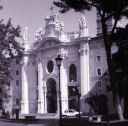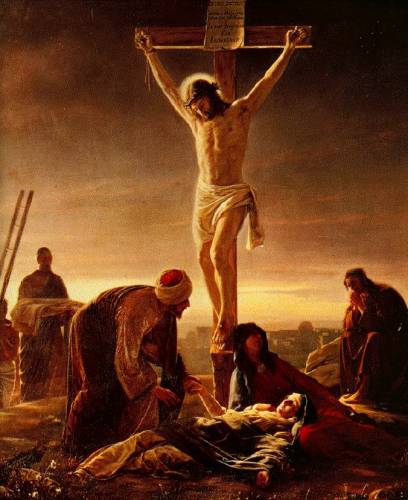First Station
Jesus Condemned to Death
This is how one should regard us, as servants of Christ and stewards of the mysteries of God. Moreover it is required of stewards that they be found trustworthy. But with me it is a very small thing that I should be judged by you or by any human court. I do not even judge myself. I am not aware of anything against myself, but I am not thereby acquitted. It is the Lord who judges me. Therefore do not pronounce judgment before the time, before the Lord comes, who will bring to light the things now hidden in darkness and will disclose the purposes of the heart. Then every man will receive his commendation from God.
(1 Corinthians 4, 1-5)
V. Prove me, O Lord, and try me.
R. Test my heart and my mind. (Psalm 25, 2)
Let us pray.
Lord Jesus Christ, Lamb without blemish or spot,
You accepted the judgment of a human tribunal,
and by Your humble surrender to a sentence of condemnation,
opened to sinners the tribunal of Your inexhaustible mercy;
look graciously upon Your priests,
that as faithful stewards of the mysteries of God,
they may draw sinners into the embrace of the Father,
Who not sparing You, gave You up for us all.
With Whom You live and reign
in the unity of the Holy Spirit,
God, forever and ever.
Second Station
Jesus Is Laden with the Cross
Behold, I go forward, but he is not there; and backward, but I cannot perceive him; on the left hand I seek him, but I cannot behold him; I turn to the right hand, but I cannot see him. But he knows the way that I take; when he has tried me, I shall come forth as gold. My foot has held fast to his steps; I have kept his way and have not turned aside. I have not departed from the commandment of his lips; I have treasured in my bosom the words of his mouth. (Job 30, 10-12)
V. Surely He has borne our griefs.
R. And carried our sorrows. (Is 53, 4)
Let us pray.
Lord Jesus Christ, laden with the wood of the Cross,
You were regarded as a lamb to be slaughtered;
be the strength of those priests of Yours
who go forward in the midst of tribulation and distress,
famine, weariness, and peril,
that comforted by Your presence,
they may, in turn, be able to comfort those
who are in any affliction,
with the comfort that You have given them.
Who live and reign with the Father,
in the unity of the Holy Spirit,
God, forever and ever.
Third Station
Jesus Falls the First Time
They abhor me, they keep aloof from me; they do not hesitate to spit at the sight of me. Because God has loosed my cord and humbled me, they have cast off restraint in my presence. On my right hand the rabble rise, they drive me forth, they cast up against me their ways of destruction. (Job 30, 10-12)
V. When I thought, "My foot slips."
R. Your mercy, O Lord, held me up. (Psalm 93, 18).
Let us pray.
Lord Jesus Christ, Creator of man from the dust of the earth,
You fell beneath the weight of the tree
and, in the sight of all, lay humbled in that very dust;
reveal to those priests of Yours brought low by weakness
the surpassing power of Your grace deployed in infirmity,
for when they are weak, You are their strength,
and when they fall, You raise them up.
Who live and reign with the Father,
in the unity of the Holy Spirit,
God, forever and ever.
Fourth Station
Jesus Meets His Afflicted Mother
What can I say for you, to what compare you, O daughter of Jerusalem? What can I liken to you, that I may comfort you, O virgin daughter of Zion? For vast as the sea is your ruin; who can restore you? (Lamentations 2, 13)
V. Cry aloud to the Lord, O daughter of Zion.
R. Let tears stream down like a torrent day and night. (Lamentations 2, 18)
Let us pray.
Lord Jesus Christ, despised and rejected by men,
Man of Sorrows, acquainted with grief,
Your Virgin Mother beheld Your Face
bruised and bloodied, disfigured and defiled,
and You, in her gaze, beheld a pool of tenderness
for the refreshment of Your Heart and the hearts of Your priests
through the ages;
grant that every priest of Yours
may find in Mary's pure gaze
the courage to advance along the Way of the Cross
until, with her, he enters forever into the joy of Your Resurrection.
Who live and reign with the Father,
in the unity of the Holy Spirit,
God, forever and ever.
Fifth Station
Simon the Cyrenian Is Made to Help Jesus
Brethren, I do not consider that I have made it my own; but one thing I do, forgetting what lies behind and straining forward to what lies ahead, I press on toward the goal for the prize of the upward call of God in Christ Jesus. Let those of us who are mature be thus minded; and if in anything you are otherwise minded, God will reveal that also to you. Only let us hold true to what we have attained. Brethren, join in imitating me, and mark those who so live as you have an example in us. For many, of whom I have often told you and now tell you even with tears, live as enemies of the cross of Christ. Their end is destruction, their god is the belly, and they glory in their shame, with minds set on earthly things. But our commonwealth is in heaven, and from it we await a Savior, the Lord Jesus Christ. (Philippians 3, 13-20)
V. Remember, O Lord, what has befallen us.
R. Behold, and see our disgrace. (Lamentations 5, 1)
Let us pray.
Lord Jesus Christ, Eternal High Priest,
You sympathize with our weaknesses
for in the days of Your flesh
You were tempted as we are, yet without sin;
with confidence, then, do we draw near to You
humbly praying that Your priests may receive mercy and find grace
to take upon their shoulders that sweet yoke of the Cross
by which You bind them to Yourself in the mystery of Your Sacrifice.
Who live and reign with the Father,
in the unity of the Holy Spirit,
God, forever and ever.
Sixth Station
Veronica Wipes the Face of Jesus
And we all, with unveiled face, beholding the glory of the Lord, are being changed into his likeness from one degree of glory to another; for this comes from the Lord who is the Spirit. Therefore, having this ministry by the mercy of God, we do not lose heart. For what we preach is not ourselves, but Jesus Christ as Lord, with ourselves as your servants for Jesus' sake. For it is the God who said, "Let light shine out of darkness," who has shone in our hearts to give the light of the knowledge of the glory of God in the face of Christ. (2 Corinthians 3, 18; 4, 1, 5-6)
V. Of you my heart has spoken, "Seek His Face."
R. It is Your Face, O Lord, that I seek.
Let us pray.
Lord Jesus Christ,
Image of the Invisible God,
with no form or comeliness that we should look at You,
and no beauty that we should desire You,
open the eyes of Your priests to the light of Your Countenance
that. by contemplating Your Holy Face,
the sacramental character of your priesthood in their souls
may grow ever more radiant
for the glory of Your Father
and the joy of Your Spouse, the Church.
Who live and reign with the Father,
in the unity of the Holy Spirit,
God, forever and ever.
Seventh Station
Jesus Falls the Second Time
Three times I have been beaten with rods; once I was stoned. Three times I have been shipwrecked; a night and a day I have been adrift at sea; on frequent journeys, in danger from rivers, danger from robbers, danger from my own people, danger from Gentiles, danger in the city, danger in the wilderness, danger at sea, danger from false brethren; in toil and hardship, through many a sleepless night, in hunger and thirst, often without food, in cold and exposure. And, apart from other things, there is the daily pressure upon me of my anxiety for all the churches. Who is weak, and I am not weak? Who is made to fall, and I am not indignant? If I must boast, I will boast of the things that show my weakness. (2 Corinthians 11, 25-30)
V. My grace is sufficient for you.
R. For my power is made perfect in weakness. (2 Corinthians 12, 9)
Let us pray.
Lord Jesus Christ,
You fell beneath the weight of the Cross
and so made Yourself close to all who cleave to the dust
in moments of humiliation, failure, and disgrace;
by the grace of Your abasement
raise those of Your priests who have fallen low,
restore unto them the joy of Your salvation,
and strengthen them with a perfect spirit.
Who live and reign with the Father,
in the unity of the Holy Spirit,
God, forever and ever.
Eighth Station
Jesus is Comforted by the Women of Jerusalem
On the left hand I seek him, but I cannot behold him; I turn to the right hand, but I cannot see him. But he knows the way that I take; when he has tried me, I shall come forth as gold. My foot has held fast to his steps; I have kept his way and have not turned aside. I have not departed from the commandment of his lips; I have treasured in my bosom the words of his mouth. (Job 23, 9-12)
V. Have pity on me, have pity on me, O you my friends.
R. For the hand of God has touched me. (Job 19:21)
Let us pray.
Lord Jesus Christ,
You revealed the thoughts of Your Heart to the women of Jerusalem,
enjoining them to weep for themselves and for their children;
pierce the hearts of Your priests with sorrow for sin,
giving them the grace to mingle their tears
with those of the spiritual mothers
whom You have called to console and sustain the priesthood
by the hidden oblation of their sufferings and their prayer.
Who live and reign with the Father,
in the unity of the Holy Spirit,
God, forever and ever.
Ninth Station
Jesus Falls the Third Time
He has made me a byword of the peoples, and I am one before whom men spit.
My eye has grown dim from grief, and all my members are like a shadow. (Job 17, 6-7)
V. My soul cleaves to the dust.
R. Revive me according to Your Word. (Psalm 118, 25)
Let us pray.
Lord Jesus Christ, when you fell a third time
beneath the terrible weight of the Cross
a rain of insults assailed Your Heart in all its tenderness;
allow us, by adoring the mystery of Your humiliation,
to obtain for the most shamed and broken of Your priests
the grace to recover their sacred dignity
and to honour the character of Your priesthood
that is forever inscribed in their souls.
Who live and reign with the Father,
in the unity of the Holy Spirit,
God, forever and ever.
Tenth Station
Jesus is Stripped of His Garments
Have this mind among yourselves, which is yours in Christ Jesus, who, though he was in the form of God, did not count equality with God a thing to be grasped, but emptied himself, taking the form of a servant, being born in the likeness of men. And being found in human form he humbled himself and became obedient unto death, even death on a cross. (Philippians 2, 5-8).
V. They divided My garments among them.
R. And for My raiment they cast lots. (Psalm 21, 18)
Let us pray.
Lord Jesus Christ,
by the abjection of Your nakedness
You won for the children of Adam and Eve
a vesture of grace and of glory
more beautiful by far than the original innocence they lost by sin;
grant to all Your priests the gift of calling sinners to repentance
and of restoring to Your friendship
those whom sin has caused to hide from Your face.
Who live and reign with the Father,
in the unity of the Holy Spirit,
God, forever and ever.
Eleventh Station
Jesus is Nailed to the Cross
But far be it from me to glory except in the cross of our Lord Jesus Christ, by which the world has been crucified to me, and I to the world. . . . Peace and mercy be upon all who walk by this rule, upon the Israel of God. Henceforth let no man trouble me; for I bear on my body the marks of Jesus. (Galatians 6, 14-17).
V. He Himself bore our sins in His Body.
R. By His wounds you have been healed. (1 Peter 2, 24)
Let us pray.
Lord Jesus Christ,
you were nailed to the wood of the Cross
so that, by Your wounds and by the shedding of your Blood,
those wounded by sin might find healing and copious redemption;
look, then, upon your priests --
heal those wounded by sin
and, in Your inexhaustible mercy,
use them to make many whole,
for You are the Physician of our souls and bodies.
Who live and reign with the Father,
in the unity of the Holy Spirit,
God, forever and ever.
Twelfth Station
Jesus Dies Upon the Cross
It was now about the sixth hour, and there was darkness over the whole land until the ninth hour, while the sun's light failed; and the curtain of the temple was torn in two. Then Jesus, crying with a loud voice, said, "Father, into thy hands I commit my spirit!" And having said this he breathed his last. (Luke 23, 44-46)
V. One of the soldiers open His side with a spear.
R. And at once there came out blood and water. (John 19, 34)
Lord Jesus Christ, Priest and Victim,
glorious in this, the Hour of Your Sacrifice,
pour forth upon all the priests of Your Church
the sanctifying Breath of Your Mouth.
Wash them in that torrent of mercy
that ever flows from Your pierced side
and, at the hour of their death,
make them worthy of joining You
before the Father in the heavenly sanctuary beyond the veil,
where You are always living to make intercession for us.
Who live and reign with the Father,
in the unity of the Holy Spirit,
God, forever and ever.
Thirteenth Station
Jesus Is Taken Down from the Cross
Now there was a man named Joseph from the Jewish town of Arimathea. He was a member of the council, a good and righteous man, who had not consented to their purpose and deed, and he was looking for the kingdom of God. This man went to Pilate and asked for the body of Jesus. Then he took it down and wrapped it in a linen shroud, and laid him in a rock-hewn tomb, where no one had ever yet been laid. It was the day of Preparation, and the sabbath was beginning. (Luke 23:50-54)
V. This is My Body which is for you.
R. I came that you may have life, and have it abundantly. (1 Corinthians 11, 24; John 10, 10)
Let us pray.
Lord Jesus Christ,
Immaculate Lamb immolated upon the altar of the Cross,
bestow, we beseech You, upon all your priests
such purity of heart in drawing near to Your altar,
such adoration in the enactment of Your sacrifice,
and such reverence in the handling of Your Holy Mysteries,
that by their decreasing in the eyes of men,
You may increase until, at length,
You are all in all.
Who live and reign with the Father,
in the unity of the Holy Spirit,
God, forever and ever.
Fourteenth Station
Jesus Is Laid in the Tomb
Thanks be to God, who in Christ always leads us in triumph, and through us spreads the fragrance of the knowledge of him everywhere. For we are the aroma of Christ to God among those who are being saved and among those who are perishing, to one a fragrance from death to death, to the other a fragrance from life to life. (2 Corinthians 2, 14-16)
V. If anyone is in Christ, he is a new creation.
R. The old has passed away; behold the new has come.
Let us pray.
Lord Jesus Christ,
hidden from our eyes,
and silent in the stillness of the tomb,
let the prayer of Your Virgin Mother
enfold the priests of Your Church
and sustain them in the valley of the shadow of death,
that by always carrying Your Passion in their bodies,
they may contemplate Your Face in faith's dark night
and rejoice in the revelation of Your glory.
Who live and reign with the Father,
in the unity of the Holy Spirit,
God, forever and ever.

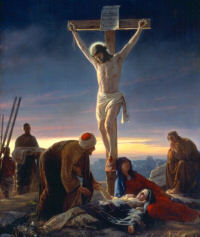
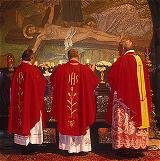 According to the Church's ancient tradition, the sacraments are not celebrated on Good Friday nor Holy Saturday. "Celebration of the Lord's Passion," traditionally known as the "Mass of the Presanctified," (although it is not a mass) is usually celebrated around three o'clock in the afternoon, or later, depending on the needs of the parish.
According to the Church's ancient tradition, the sacraments are not celebrated on Good Friday nor Holy Saturday. "Celebration of the Lord's Passion," traditionally known as the "Mass of the Presanctified," (although it is not a mass) is usually celebrated around three o'clock in the afternoon, or later, depending on the needs of the parish.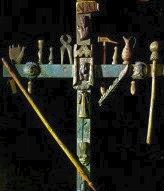 This is a day of mourning. We should try to take time off from work and school to participate in the devotions and liturgy of the day as much as possible. In addition, we should refrain from extraneous conversation. Some families leave the curtains drawn, and maintain silence during the 3 hours (noon — 3p.m.), and keep from loud conversation or activities throughout the remainder of the day. We should also restrict ourselves from any TV, music or computer—these are all types of technology that can distract us from the spirit of the day.
This is a day of mourning. We should try to take time off from work and school to participate in the devotions and liturgy of the day as much as possible. In addition, we should refrain from extraneous conversation. Some families leave the curtains drawn, and maintain silence during the 3 hours (noon — 3p.m.), and keep from loud conversation or activities throughout the remainder of the day. We should also restrict ourselves from any TV, music or computer—these are all types of technology that can distract us from the spirit of the day. 